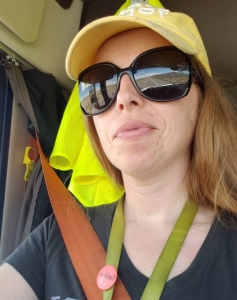
Summer trucking, just like trucking in all other seasons, comes with its perks and its downsides. For truck drivers with families, the toughest part about being a truck driver during the summer months is finding a good work life balance which allows you to generate income, while still spending important time with your spouse and children. Many drivers will select a job based on how much time they are able to spend at home, so it is very important to find a company that aligns with your needs. The last thing you want to miss is barbecues, trips to amusement parks, or family reunions, so finding this balance is key.
Depending on your company’s policies, you may have the option to bring a spouse, kids, or the whole crew along on your trips, so our list of tips will be split into two categories: Making the Most of the Summer with Your Family on the Road and Tips for Staying Connected When You Are Away from Your Family.
Making the Most of the Summer with Your Family on the Road
According to Healthy Trucking of America, 13.6% of all truck drivers suffer from some level of depression, with one of the leading causes being spending too much time alone. This is especially true for truck drivers with families. The summertime is an important season for spending quality time with family and making new memories, so it is important for truckers to be able to have this time.
For this reason, many companies offer the flexibility to bring family members along during a haul, so that you don’t miss out on anything. Now, even within a company that permits bringing people onboard your rig, there are different rules and procedures in place, so it is important to check with your company before getting on the road. Some companies have a minimum age requirement for children who will be traveling onboard, for example.
After determining your company’s rider policy, you will then want to make sure your cab is suitable for the family. Can more than one person comfortably ride in it? What can you add to make it more kid-friendly? Road trips can already be a lot of work when traveling with children but could be especially taxing if they are not used to riding in a big rig. Before setting off on your trip, make sure you have everything you need to make for a great ride. This can include entertainment for the kids, lots of snacks, pillows for naps, and plenty of ways to stay cool during the inevitable heat of summer.
Another important factor to consider is the actual route of the trip. Some trips may be along routes that wouldn’t be suitable for the whole family, especially if they are known for severe or sudden changes in the weather. Mountain driving may not be for everyone, so if your route requires that, you may want to hold off on that one as a family trip. No matter what route you are taking, plan to make some stops along the way that are both trucker and kid-friendly. By planning ahead, you can make sure there are plenty of places to stop to eat, use the restroom, and even play, along the way. Consider looking for rest stops that offer picnic areas or playgrounds to make sure the kids can get out and stretch their legs during the trip. Making random stops is one of the most memorable parts of a road trip, so you definitely do not want to leave this out! Depending on your route, you may be able to coordinate a stop at popular destinations like these to keep the whole family entertained.
Taking everyone on the road with you while working a job may not be the typical way to spend a summer vacation together, but it is a unique experience that allows you to show your family what you do, the beauty of the open road, and all the memories you can make along the way.
Tips for Staying Connected When You Are Away from Your Family
If your company does not allow you to bring family members on the road with you, or you are traveling on a route with adverse conditions, there are several creative ways to stay in touch with your spouse and kids while you are out working.
- Pen Pals: Handwritten letters and postcards are a fun way to stay in touch with the family and hold much more sentimental value than a text message or email. As you make your way across the country, pick up unique, pretty, or funny postcards or small gifts to send back home. Take pictures of your travels and include those as well. Handwritten communication is rare, which makes it very special, and your kids will definitely want to hang onto the special mementos you took the time to send.
- FaceTime/Video Chat: While handwritten sentiments are incredibly special, technology has evolved in a way that makes being away from your loved ones for extended periods easier with options such as FaceTime or video chats. While these interactions aren’t the same as having your family around in person, they offer a great chance to connect and see what everyone is up to. It also gives you a chance to show your family what life on the road is like and some of the areas you are traveling.
- Social Media: Social media is another way to stay connected with your family, especially if you’re spread out across the country. Sharing pictures of your trip can allow your spouse and kids to feel connected to what you are up to and see a part of the country they may not have seen before. It also allows you to send motivational content to each other, as well as do live videos.
Do you have special spots you like to travel to with your family during the summer months? Would you like to share how your kids stay entertained while traveling in your truck? Connect with us on Facebook or Instagram to share your stories!


 Facetime, Skype, and Zoom are all great video calling platforms that have a free plan for users. Especially with younger children, being able to see and hear each other is huge. Even when you’re away, your kids will know your voice and be excited to see you when you walk through the door.
Facetime, Skype, and Zoom are all great video calling platforms that have a free plan for users. Especially with younger children, being able to see and hear each other is huge. Even when you’re away, your kids will know your voice and be excited to see you when you walk through the door.

 Not all parenting tips are about the kids! As you share time with your children, don’t forget to
Not all parenting tips are about the kids! As you share time with your children, don’t forget to 












